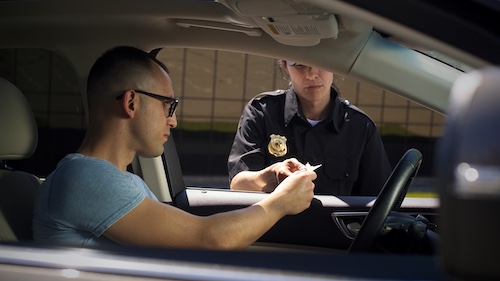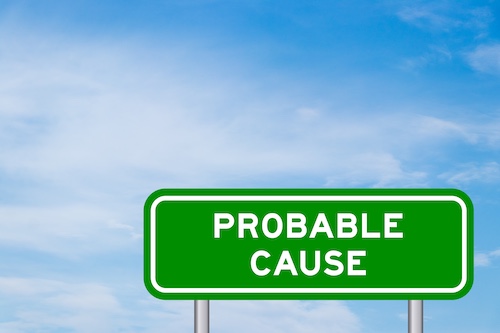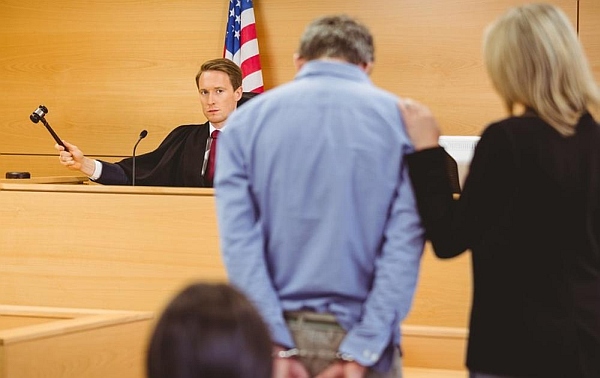Why Probable Cause Matters in DUI Stops
Police need more than mere suspicion to stop, search, or arrest someone for DUI in North Carolina. The law requires specific facts that would lead a reasonable person to believe a crime has occurred. This is called probable cause. Without it, the stop may be illegal, and any evidence collected could be thrown out. If you were pulled over without clear justification, understanding how probable cause works could help protect your rights and your case.
In this blog, we explain how probable cause works under North Carolina law and the federal statutory provisions relevant , what happens when it is missing, and why working with an experienced Asheville DUI defense lawyer is important if you believe your rights were violated during a traffic stop.
What Is Probable Cause?
Probable cause is the legal standard police must meet before making an arrest, conducting a search, or requesting a warrant.
Definition in Law
Probable cause exists when facts and circumstances would lead a reasonable person to believe that a crime has been or is being committed. It is required under the Fourth Amendment of the U.S. Constitution and is also defined in N.C. Gen. Stat. § 15A-401(b). It applies to both search warrants and arrests, ensuring that law enforcement actions are based on more than suspicion.
More Than a Hunch
Probable cause must be based on specific and clear facts. A police officer cannot act on a gut feeling or vague assumption. Courts have ruled that actions based on mere suspicion or intuition do not meet the required legal standard. The officer must identify real indicators of criminal activity, not just behavior that appears unusual.
Probable Cause vs. Reasonable Suspicion
Reasonable suspicion allows an officer to briefly stop and question a person based on observable facts. Probable cause, however, is a higher standard needed for a search or arrest. While both rely on practical judgment, probable cause demands a stronger connection between the observed facts and suspected criminal activity.
How Police Establish Probable Cause
Law enforcement must base probable cause on trustworthy information or direct observation. This includes signs like impaired driving, visible contraband, or reliable reports from informants. An affidavit showing probable cause must include enough detail to convince a judge or magistrate that a crime likely occurred.
Role in Court Proceedings
Probable cause is often reviewed during criminal court hearings and motions. Judges may examine whether the facts at the time of arrest or search met the legal standard. If they find that the officer lacked probable cause, the court may exclude the evidence using the exclusionary rule and suppress any information collected through an unlawful search.
Legal Framework: Probable Cause in North Carolina
Understanding how North Carolina defines and applies probable cause helps determine whether a stop, search, or arrest was lawful.
Statutory Basis for Probable Cause
North Carolina law sets clear rules for when police officers can arrest or search a person. A law enforcement officer may make a warrantless arrest if there are reasonable grounds to believe that the person has committed a criminal offense. This belief must be based on facts that would lead a reasonable and prudent person to the same conclusion.
For searches, N.C. Gen. Stat. § 15A-242 through § 15A-245 outlines what must be included in a search warrant request. The affidavit must show probable cause and include facts sufficient for a magistrate to issue the warrant. If the affidavit is based on hearsay, it must explain why the information is reliable.
Role of the Magistrate
A magistrate decides whether the facts presented justify the issuance of a search warrant or arrest warrant. The magistrate must evaluate whether the information in the affidavit meets the legal threshold of probable cause. If the affidavit fails to provide sufficient probable cause, the court may later declare the search or arrest unlawful.
The magistrate must determine that the facts presented offer a fair probability that evidence of a crime will be found at the place named in the warrant. This is required under both North Carolina law and the warrant clause of the Fourth Amendment.
Warrantless Arrests and Searches
North Carolina law allows warrantless arrests in certain situations, but only if probable cause exists at the time of arrest. The officer must base this on specific, factual observations, not mere suspicion. If the officer arrests someone without a warrant and without sufficient probable cause, the arrest is invalid.
Similarly, a warrantless search is only legal if it falls within a recognized exception and is supported by probable cause. If the police conduct a search without a valid warrant or exception, the court may suppress any physical evidence obtained during the search.
Judicial Review and Trial Court Decisions
When a case reaches court, a judge may review whether the arrest or search met the legal standard for probable cause. Courts use the totality of the circumstances test, considering all facts known to the officer at the time. They also consider whether the officer relied on reasonably trustworthy information.
If the court finds that probable cause did not exist, any evidence obtained may be excluded from the criminal trial. This outcome protects the defendant’s rights under the Fourth Amendment and limits the use of unlawfully obtained evidence.
“Just a Hunch” Is Not Enough: Common Police Errors
Probable cause must be based on facts, not assumptions or vague impressions, yet many unlawful stops and searches begin with insufficient evidence.
Relying on Mere Suspicion
Police officers sometimes act on observations that amount to no more than a guess. Shaky justifications like “the driver looked nervous” or “the vehicle was in a high-crime area” do not meet the legal threshold for probable cause. Courts have ruled that acting on mere suspicion or intuition does not justify a stop, search, or arrest.
A valid stop must be based on specific, articulable facts that suggest a law has been broken. Anything less is not enough. When officers rely on general behavior or personal hunches without supporting evidence, the resulting search or seizure may violate the Fourth Amendment.
Inadequate Supporting Affidavits
When seeking a search warrant, law enforcement must present a supporting affidavit with facts sufficient to establish probable cause. Errors occur when officers submit affidavits that are vague, lack factual details, or depend on secondhand claims without verifying the informant’s credibility.
North Carolina law, under N.C. Gen. Stat. § 15A-244, requires a written affidavit that shows a fair probability that evidence of a crime will be found in a particular place. If the affidavit is legally insufficient, any warrant based on it may be declared invalid. The evidence obtained under that warrant could then be excluded in court.
Ignoring Practical Considerations
Officers must weigh practical considerations when forming probable cause. Rushing to search or arrest without evaluating all the circumstances can result in flawed decisions. Courts often review whether a reasonable and prudent person would have reached the same conclusion.
Failing to observe key facts or acting on incomplete information can lead to a search or arrest that does not hold up in criminal court. Reviewing courts have reversed trial court decisions where law enforcement failed to act with reasonable caution or ignored supporting details that were legally required.
Consequences of Acting Without Probable Cause
When law enforcement conducts a search or makes an arrest without probable cause, the evidence obtained may be excluded from the criminal trial under the exclusionary rule. This rule prevents the use of physical evidence or testimony that results from unconstitutional police conduct.
What Happens When Probable Cause Is Lacking?
When police act without probable cause, it can affect how evidence is handled and whether charges are allowed to proceed in court.
Evidence May Be Suppressed
If a law enforcement officer conducts a search or arrest without probable cause, any evidence collected may be ruled inadmissible. Courts apply the exclusionary rule to prevent the use of physical evidence or statements obtained through unlawful actions. This protects Fourth Amendment rights and discourages unreasonable searches and seizures.
Charges Can Be Dismissed
Without sufficient probable cause, prosecutors may be forced to drop the charges. If the key evidence is excluded, they may lack the ability to prove guilt beyond a reasonable doubt. A judge may also dismiss the case during a probable cause hearing if the state cannot present facts that justify the arrest or search.
Impact on Trial Strategy
A DUI defense lawyer may file a motion to suppress evidence obtained from an illegal stop. If the court grants the motion, the prosecution cannot use that evidence at trial. This often weakens the case and may lead to a plea reduction or dismissal.
Long-Term Legal Effects
Acting without probable cause can affect future cases for the officer involved. If a court finds repeated violations, it may question the officer’s credibility. In some situations, departments may review internal procedures or training. This helps prevent future violations and protects the integrity of criminal procedure.
The Role of Appellate Review
If a trial court denies a motion to suppress, the defense may appeal. Reviewing courts use de novo appellate review to examine the legal basis for the original decision. They look at all the circumstances to decide if the officer had reasonably trustworthy information and factual grounds to act. If not, the appellate court may reverse the ruling.
Contact an Experienced Asheville DUI Defense Attorney Today!
If you believe you were stopped, searched, or arrested without probable cause, do not wait to take action. The consequences of an unlawful stop can affect the outcome of your entire case. Our team at Asheville DUI Guy has the experience and focus to challenge weak evidence and protect your rights at every stage of the process.
Contact us at 828-759-5556 for a free case consultation today!







